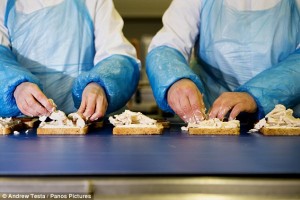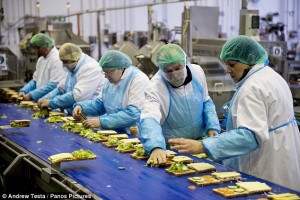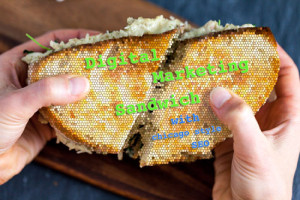Though it is nice to know your lunchtime sandwich is handmade, how many hands is that, exactly? Thousands of readers reacted with horror to some startling photographs in yesterday’s Mail taken inside a Nottinghamshire factory that supplies millions of sandwiches to British supermarkets.
 They were outraged that workers — an army of them — were smushing and smearing gloopy fillings with their bare hands onto slices of bread, chugging by on a conveyor belt.
They were outraged that workers — an army of them — were smushing and smearing gloopy fillings with their bare hands onto slices of bread, chugging by on a conveyor belt.
Fingers, thumbs and palms all over your lunch, not least the factory workers’ sleeves taking a dip in what looked like chicken mayo. Yuck. No polythene food-safe gloves, no tongs, just the odd sauce-squirter shooting a blob of salad cream smack into the centre of the bread. Bullseye!
Factory owner Greencore, which supplies High Street giants such as Waitrose, Marks & Spencer, Sainsbury’s, Co-op, Asda and Boots, insists that the use of bare hands is, in fact, a hygienic and safe way to produce the nation’s favourite lunchtime convenience food. We have to take Greencore’s word for it that strict hand-washing regimes are a better deterrent against cross-contamination.
But never mind the bare hands; what about the rubbish inside some sarnies?
The UK sandwich market is worth approximately £3.6 billion, with consumers buying an estimated two billion sandwiches each year. A survey last month of 2,000 office workers revealed that the nation’s favourite lunch was the humble cheese sandwich, with 32 per cent of those surveyed saying they’d had one for lunch every day for the past four-and-a-half years.
I do not know about the quality of the Nottingham factory’s ingredients, which may not be beset by the problems elsewhere. Greencore prides itself on operating to the highest standards. But I do know that we should be wary of convenience foods — and many of the shop sarnies found on the High Street today. We are often talking about food that is downright fake and overpriced.
 For example so-called meats that are actually a glued-together mush of pulped pork, starch, sometimes proteins made with animal blood plasma, water, (lots of) salt, preservatives and flavourings.
For example so-called meats that are actually a glued-together mush of pulped pork, starch, sometimes proteins made with animal blood plasma, water, (lots of) salt, preservatives and flavourings.
Meanwhile, the Belgian Federal Agency for the Safety of the Food Chain was asked if it was acceptable from a food safety point of view to deviate from the legal storage temperature of sandwiches, in particular 13 °C instead of 4 °C or 7 °C, depending on the type of garnish and if an upward temperature fluctuation of 3 °C, measurement uncertainty included, can still be accepted.
The Scientific Committee estimates that the additional food safety risk arising as a result of the storage of sandwiches at 13 °C during 3 hours is low if the sandwiches are kept thereafter maximum during 4 hours at ambient temperature. This risk estimation does not apply for sandwiches with fresh meat and meat preparations (including carpaccio, minced meat, steak tartare) or fresh fish which are inherently more susceptible to microbiological contamination and putrefaction or growth of pathogens under non-refrigerated storage conditions. For an upward temperature fluctuation of 3 °C, measurement uncertainty included, the food safety risk is estimated as low if it only occurs when this is necessary for the handling during the preparation, transport, storage, display and delivery of foods.
 Denise Grady of The New York Times reports a three-inch wood pick, from a sandwich, traveled through most of his digestive tract without doing any harm. But then it poked through the intestinal wall and pierced an artery, creating a conduit for bacteria to invade his bloodstream and damaging the artery enough to cause serious bleeding.
Denise Grady of The New York Times reports a three-inch wood pick, from a sandwich, traveled through most of his digestive tract without doing any harm. But then it poked through the intestinal wall and pierced an artery, creating a conduit for bacteria to invade his bloodstream and damaging the artery enough to cause serious bleeding.






 treatment from paramedics after the plane landed in Minneapolis, Delta said.
treatment from paramedics after the plane landed in Minneapolis, Delta said. indicated low levels of listeria were present although he stressed these were within the legal limits.
indicated low levels of listeria were present although he stressed these were within the legal limits. unsanitary conditions and bacterial contamination in the facility.
unsanitary conditions and bacterial contamination in the facility. officer, according to records.
officer, according to records.